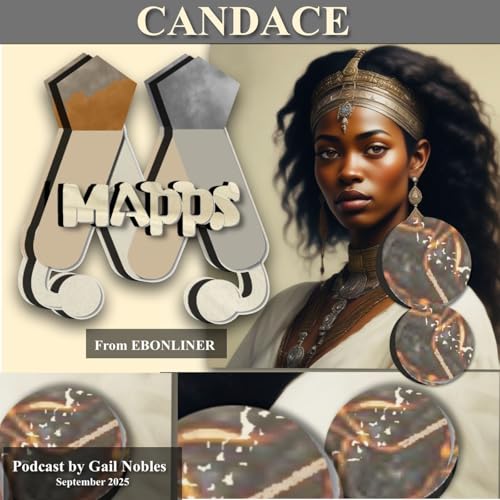
Candace 9:24:25 5.34 PM
No se pudo agregar al carrito
Solo puedes tener X títulos en el carrito para realizar el pago.
Add to Cart failed.
Por favor prueba de nuevo más tarde
Error al Agregar a Lista de Deseos.
Por favor prueba de nuevo más tarde
Error al eliminar de la lista de deseos.
Por favor prueba de nuevo más tarde
Error al añadir a tu biblioteca
Por favor intenta de nuevo
Error al seguir el podcast
Intenta nuevamente
Error al dejar de seguir el podcast
Intenta nuevamente
-
Narrado por:
-
De:
Intro by: Gail Nobles
Cover Illus. By Gail Nobles
Welcome to Mapps! In today’s episode, we delve into an intriguing figure from the New Testament—“Candace,” the queen mentioned in Acts 8:27 of the Bible. There's much more beneath the surface of just a name, and we’re going to unpack its significance, historical context, and implications.
Firstly, let’s clarify that "Candace" is not a personal name but rather a royal title for the queen of Kush, an ancient kingdom located in what we today recognize as Sudan and southern Egypt. The Meroitic term for queen or queen mother is “Kandake.” This distinction is crucial as it reveals the culture and political structure of the Kingdom of Kush. It highlights that the title signified more than just rank; it carried with it a legacy of power and authority that spanned centuries.
In the context of Acts 8:27, we encounter a eunuch who serves under "Candace, queen of the Ethiopians." This provides insight into the socio-political landscape during that era. The mention of the kingdom as Ethiopian is a nod to the historical and geographical connotations of the time. This region, rich in culture and trade, was pivotal in connecting different civilizations, including the Romans and the Egyptians.
Candace represents not only a title but also the idea of strong female leadership in the ancient world. Unlike many other contemporary societies, the Kingdom of Kush afforded significant power to its queens. They were often involved in royal succession and had the authority to govern in various capacities. This points to a complexity in gender roles during the time and may challenge our modern perceptions of ancient monarchies.
It’s fascinating to see how the traditions of translation can mix things up. Ancient Greek and Roman historians frequently interpreted names through their own cultural lenses, leading to a misunderstanding that “Candace” was a personal name. This confusion muddled the line between historical accuracy and narrative simplicity, impacting how we view figures from the past, including Candace.
Lastly, we arrive at the heart of the narrative—the eunuch’s encounter with Philip the Apostle. This official not only oversaw the queen’s treasury but was also returning from Jerusalem, indicating his openness to spiritual exploration.
In summary, Candace represents the connection of royal power, cultural blending, and key events in Christian history. Her title evokes questions about identity and power, challenging us to rethink our understanding of historical narrative.
Thank you for joining us for this discussion on Mapps, where we explore the rich connections between faith, history, and culture. I’m Gail Nobles. Tune in again soon.
News, Culture, and Entertainment
Todavía no hay opiniones


